When starting out as a gardening beginner, it’s important to have a few essential tools to make your gardening experience easier and more enjoyable. Here are some recommendations for basic tools for beginners.
1. Pruning Shears: These handheld pruners are essential for controlling plants that are becoming overgrown. There are two types: anvil-style pruners for deadwood and bypass pruners for live plants. Make sure to choose pruners that fit comfortably in your hand and sharpen them regularly.
2. Loppers: Loppers are long-handled pruners that are great for trimming tree branches and maintaining the overall health and appearance of your garden. Bypass loppers are more precise than anvil-style loppers.
3. Japanese Floral Scissors: While not essential, these small garden scissors are great for snipping delicate flower stems, buds, and herbs. Look for scissors with thin and sharp blades and comfortable handles.
4. Garden Hoe: A garden hoe is ideal for removing weeds and clearing away leaves. There are different types of hoes, such as a Dutch hoe, which has a sharp, wide, open blade for skimming just below the soil’s surface.
5. Garden Fork: A garden fork is useful for loosening and turning soil, especially in dense or compacted areas. Look for forks with slightly curved tines for scooping mulch or turning compost piles.
6. Garden Tool Set: Ideal for beginners, a garden tool set usually includes a trowel, transplanter, and cultivator. These hand tools are great for various tasks like digging, loosening soil, planting, and weeding.
7. Shovel/Spade: A shovel is necessary for digging holes, lifting sod, and moving dirt. Opt for a good-quality shovel with a durable handle and a rust-resistant head.
8. Garden Dibber: A garden dibber is a pointed stick used for making holes in the soil to plant seeds, seedlings, cuttings, or bulbs. Look for a dibber with measurements and a sturdy grip.
9. Rake: A rake is handy for raking leaves, spreading mulch, and cleaning up debris. Choose a rake that suits your needs, whether it’s a standard leaf rake or a smaller hand rake.
10. Watering Can: A watering can is essential for watering plants, especially when a hose can’t reach. Look for a watering can with a comfortable size and nozzle options.
11. Gloves: While not essential, a good pair of gardening gloves can protect your hands from blisters and cuts. Look for gloves that are waterproof along the palm and fingers, and consider longer gloves for extra protection.
12. Garden Scissors: Garden scissors have thin blades used for deadheading flowers, snipping herbs and flower stems, and pruning delicate plants. Look for scissors with ergonomically-designed handles.
13. Garden Hose: A garden hose is necessary for watering plants. Look for a good-quality hose with nickel-plated, heavy-duty brass couplings.
Remember, investing in sturdy tools will ensure they last for years to come. Happy gardening!
Key Takeaways:
- Basic tools for gardening beginners include pruning shears, loppers, Japanese floral scissors, garden hoe, garden fork, garden tool set, shovel/spade, garden dibber, rake, watering can, gloves, garden scissors, and garden hose.
- Investing in good-quality tools will save money in the long run and make gardening easier and more enjoyable.
Pruning Shears, Loppers, and Japanese Floral Scissors
To maintain and shape your plants, having pruning shears, loppers, and Japanese floral scissors is essential. Pruning shears are the perfect tools for controlling plant growth and maintaining their health. They come in two styles – anvil-style and bypass-style. Anvil-style shears are ideal for cutting deadwood, while bypass-style shears are better suited for live plants.
Loppers are long-handled pruners that are primarily used for trimming tree branches and thick stems. They have a greater reach than pruning shears and provide more precise cuts. Bypass loppers are perfect for making clean cuts on fresh wood and branches up to 1.5 inches in diameter.
Japanese floral scissors are smaller and have thin, sharp blades, making them perfect for snipping delicate stems and flowers. They are crafted with specialty steel and often come with satin or rubber handles for a firm grip. To prevent rust, they should be wiped and oiled regularly.
Overall, having the right pruning tools is crucial for maintaining and improving the appearance and health of your garden. So, investing in high-quality pruning shears, loppers, and Japanese floral scissors is a must for every beginner gardener.
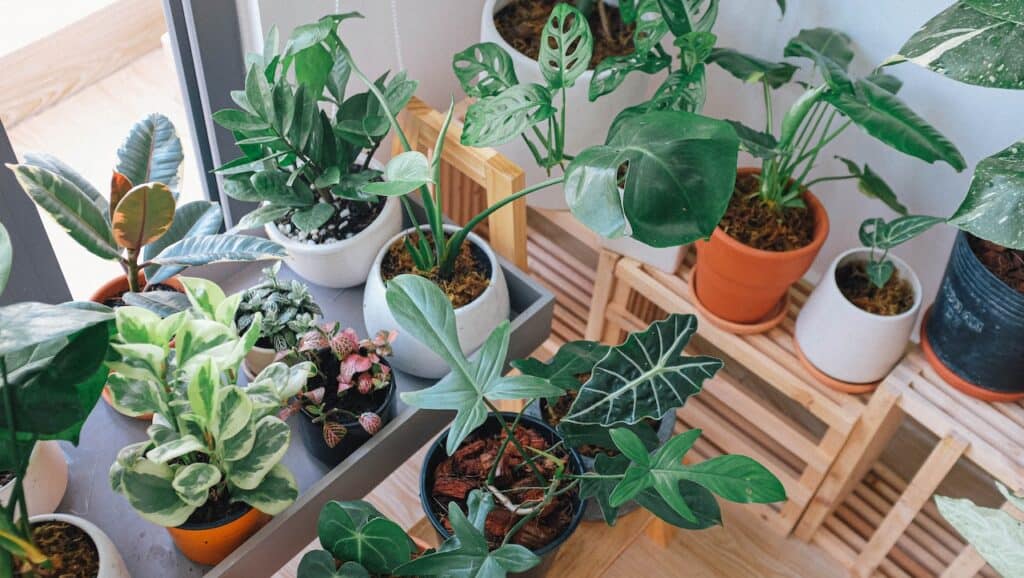
Garden Hoe, Garden Fork, and Garden Tool Set
For soil preparation and cultivation, a garden hoe, garden fork, and a garden tool set are indispensable. A garden hoe is a versatile tool that can be used for weeding, clearing leaves, and cultivating soil. This tool comes in different shapes and sizes, so it is important to choose one that suits your needs. A garden fork is great for breaking up compacted soil and turning it over. It can also be used to work in compost and other organic matter.
A garden tool set usually includes a trowel, transplanter, and cultivator, which are versatile tools for various gardening tasks. A trowel is ideal for planting small plants, digging small holes, and transplanting seedlings. A transplanter is useful for moving larger plants and digging deeper holes. A cultivator is designed to loosen and aerate soil, making it easier for plants to grow.
| Tool | Uses and Benefits |
|---|---|
| Garden Hoe | – Weeding and clearing leaves – Cultivating soil |
| Garden Fork | – Breaking up compacted soil and turning it over – Working in compost and organic matter |
| Garden Tool Set | – Trowel for planting small plants, digging small holes, and transplanting seedlings – Transplanter for moving larger plants and digging deeper holes – Cultivator for loosening and aerating soil |
When choosing these tools, it is important to invest in good-quality ones that are durable and sharp to ensure their longevity. Additionally, it is essential to take proper care of these tools by cleaning them after each use and storing them in a dry place.
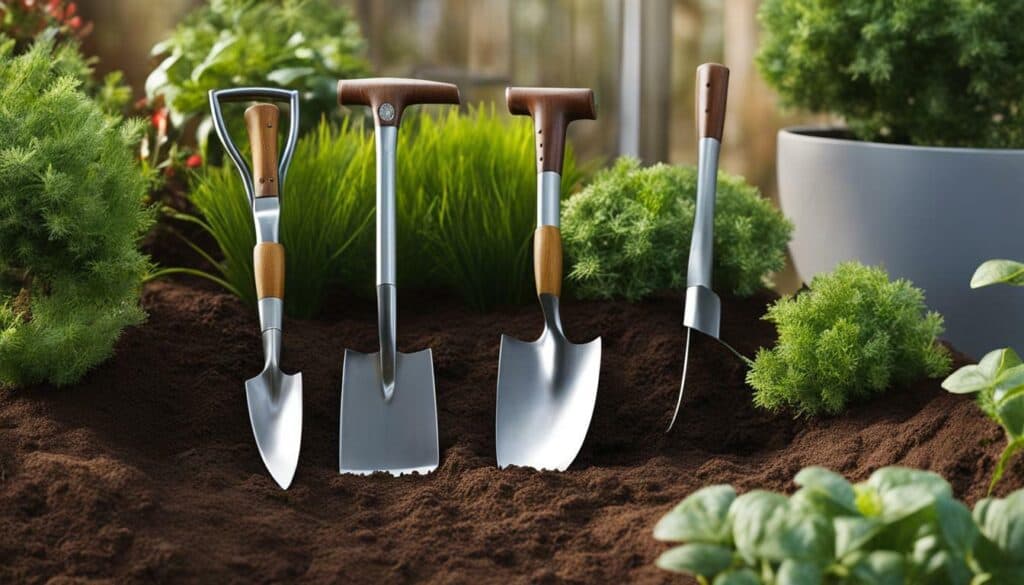
In addition to a garden hoe, garden fork, and garden tool set, other tools recommended for gardening include pruning shears, loppers, Japanese floral scissors, a shovel or spade, a garden dibber, a rake, a watering can, gloves, and a wheelbarrow. These tools help make gardening easier and more enjoyable.
Shovel/Spade and Garden Dibber
When it comes to digging tasks, having a reliable shovel/spade and a garden dibber is crucial. These two tools are essential for preparing the soil and planting seeds or seedlings.
A shovel or spade is used for digging holes, lifting sod, and moving dirt. It is recommended to invest in a high-quality shovel with a durable handle and stainless steel head. A sturdy shovel can last for years, making it a wise investment for any gardener. Stainless steel heads are rust-resistant and easy to clean, ensuring your shovel remains in good condition.
A garden dibber, on the other hand, is used for making holes in the soil for planting seeds, seedlings, cuttings, or small bulbs. It is available in wood, plastic, or metal, with metal or stainless steel dibbers being more long-lasting. Thinner dibbers are best for seeds and seedlings, while thicker ones are suitable for small bulbs. Additionally, a dibber with measurements on it is helpful for ensuring proper hole depth.
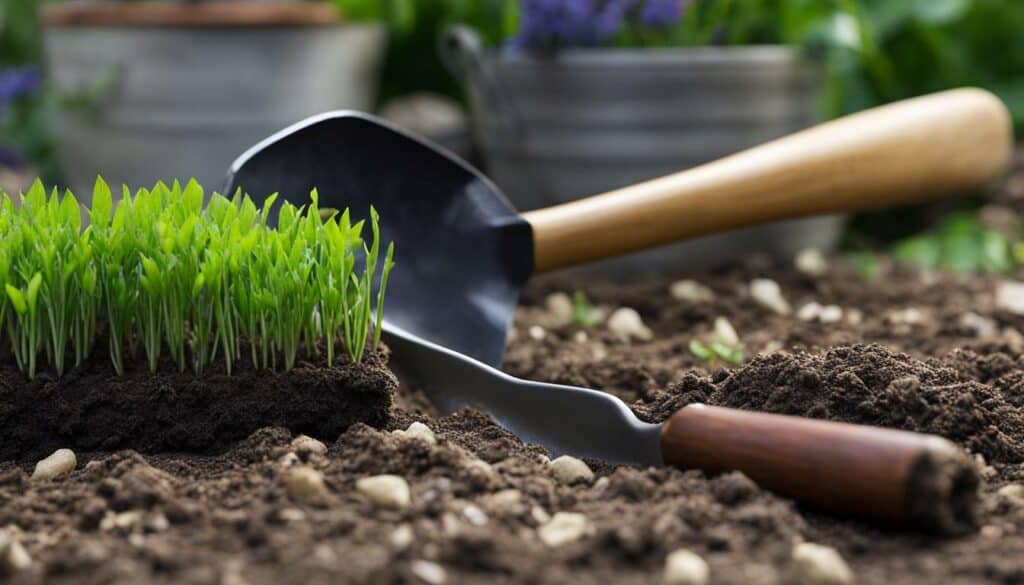
Investing in a quality shovel/spade and garden dibber will make gardening tasks easier and more efficient. By choosing durable tools, you can enjoy them for years to come as you watch your garden grow.
Rake and Watering Can
To maintain your garden and ensure proper watering, a rake and a watering can are essential tools. A rake is a great tool for removing leaves, twigs, and other debris from your lawn or garden bed. It can also be used to level soil and cultivate the garden. When choosing a rake, consider the size and style that best suits your needs. Steel tines are stronger and last longer, while plastic tines are great for delicate flower beds and lawns.
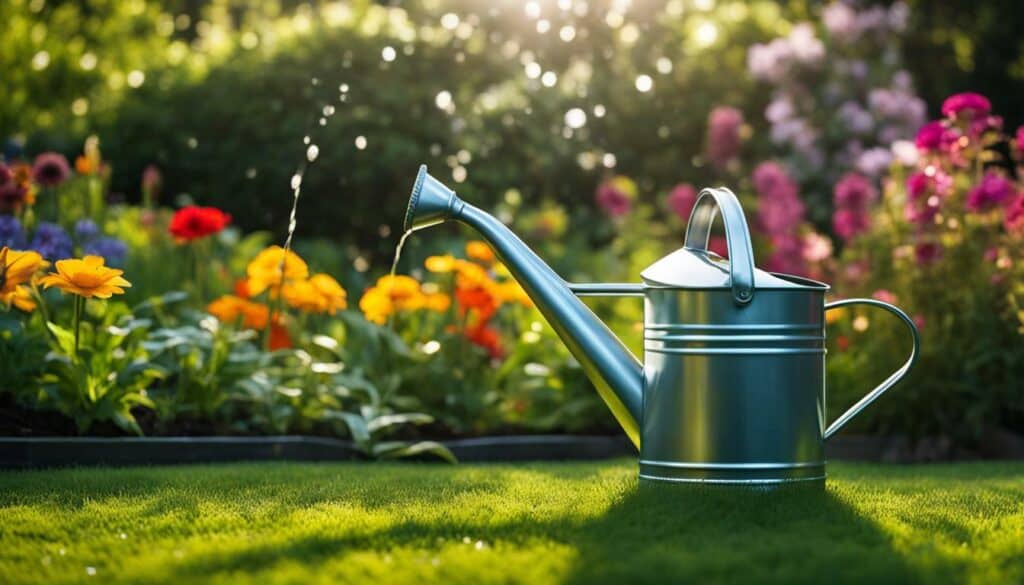
A watering can is another essential tool for gardening, especially when you need to water plants in areas where a hose cannot reach or for pot plants and plants in greenhouses. Watering cans come in a variety of materials such as plastic or metal. Although plastic cans are lightweight, they are not as durable as metal cans. If you choose a metal can, make sure it is galvanized to resist rust.
In addition to these tools, it’s important to have the right gardening gloves to protect your hands while working with them. Investing in quality tools will ensure they last for years to come and make your gardening experience more enjoyable.
Gloves and Wheelbarrow
To protect your hands and easily transport heavy materials, gloves and a wheelbarrow are must-have tools for any gardening beginner. A good pair of gloves will not only protect your hands from cuts and scrapes, but they can also provide additional grip when handling tools or plants. Look for gloves that are made from durable materials like leather or synthetic fabrics, and make sure they fit snugly but comfortably.
When it comes to transporting heavy materials like soil, rocks, or plants, a wheelbarrow is an essential tool. A good quality wheelbarrow will make it easier to move heavy loads around your garden without straining your back or arms. Look for a wheelbarrow with sturdy handles, a durable frame, and a large, deep basin that can hold a lot of weight.
Whether you’re just starting out in gardening or you’re an experienced gardener, having the right tools can make all the difference in the success of your garden. By investing in tools like gloves and a wheelbarrow, you’ll be well-equipped to handle any gardening task that comes your way.
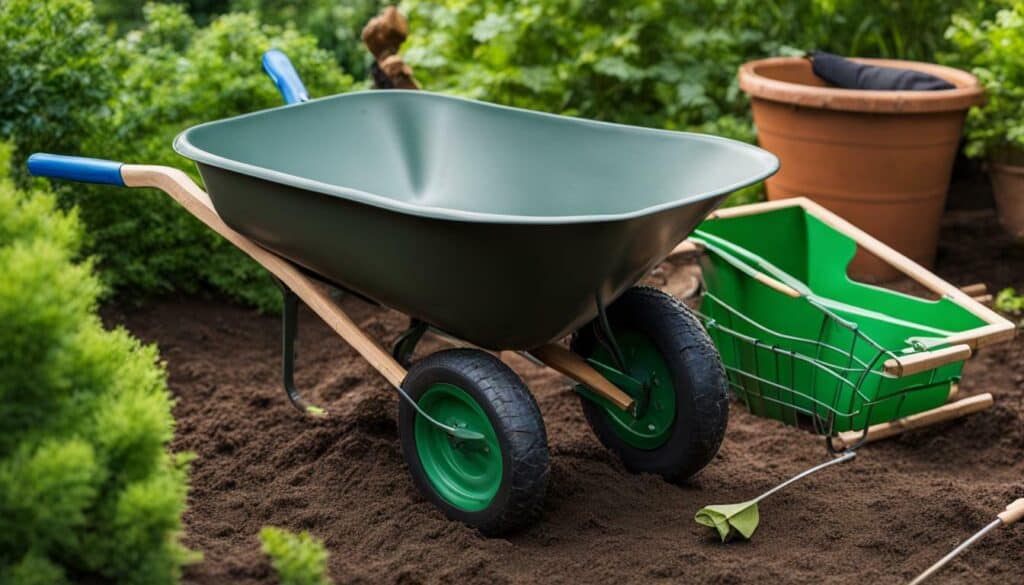
Additional Tools for Various Gardening Tasks
In addition to the basic tools, there are several other tools that can be useful for various gardening tasks. A hand trowel is a small tool that is essential for planting small plants and digging in tight spaces. A hand fork or cultivator is useful for loosening soil in small areas and removing weeds.

Long-handled shovels and spades are helpful for digging deeper holes for planting trees and shrubs and for moving larger amounts of soil. A garden sickle can be used for trimming grass and weeds in tight spaces, while a hand rake is useful for gathering small amounts of debris.
| Tool | Description |
|---|---|
| Hand Pruners and Pruning Shears | Essential for trimming small branches and stems and shaping plants. |
| Garden Kneeler | Protects knees and reduces strain on the back during planting and weeding. |
| Garden Hose | Used for watering plants and cleaning tools and surfaces. |
| Hand Saw | Useful for cutting larger branches and stems. |
| Flexible Tubs and Zip Ties | Handy for carrying soil, mulch, and other materials and securing plants and trellises. |
| Protective Clothing | In addition to gloves, gardening pants or overalls can protect clothing from dirt, moisture, and damage. |
Investing in high-quality tools will ensure their durability and longevity. Some other useful tools for specific gardening tasks include garden fabric for weed control, a bulb planter for planting bulbs, and a soil tester for checking soil pH and nutrient levels.
Conclusion
Equipping yourself with the right tools is essential for a successful gardening journey. Basic tools such as pruning shears, loppers, Japanese floral scissors, garden hoe, garden fork, garden tool set, shovel or spade, garden dibber, rake, and watering can are necessary for maintaining a healthy garden. Investing in good-quality tools that are durable and comfortable to use will make your gardening tasks easier and more enjoyable.
Other useful tools and supplies for gardeners include garden gloves, garden scissors, a hori-hori gardening knife, a garden sickle, a hand rake, a wheelbarrow or yard cart, a garden kneeler, a garden hose, a hand saw, a flexible tub, zip ties, and gardening clothing with pockets. By having these tools, you’ll be able to complete various gardening tasks efficiently and effectively.
Before purchasing your tools, do your research and choose the ones that are best suited for your needs. Remember, having the right tools is essential for a successful gardening journey. So, arm yourself with the right tools and start creating your dream garden today.
FAQ
Q: What are the essential tools for gardening beginners?
A: The essential tools for gardening beginners include pruning shears, loppers, Japanese floral scissors, a garden hoe, a garden fork, a garden tool set, a shovel/spade, a garden dibber, a rake, a watering can, gloves, and a wheelbarrow.
Q: Are there any additional tools that are recommended?
A: Yes, there are additional tools that can be beneficial for different gardening tasks. These include hand trowel, hand fork or cultivator, long-handled shovels and spades, a garden rake, hand pruners or pruning shears, a garden sickle, a small hand rake, a garden kneeler, a garden hose, a hand saw, flexible tubs, zip ties, protective clothing, and gloves.
Q: Why are these tools recommended?
A: These tools are recommended for their usefulness and durability in various gardening tasks. They are designed to make gardening easier and more efficient, helping beginners achieve successful results.
Source Links
- https://www.azurefarmlife.com/farm-blog/essential-garden-tools-for-beginners
- https://www.almanac.com/gardening-tools-guide
- https://www.washingtonpost.com/home/2023/02/28/essential-garden-tools/
- https://www.gardendesign.com/how-to/tools.html
- https://porchdaydreamer.com/essential-garden-tools/
- https://www.amazon.com/japanese-pruners/s?k=japanese pruners
- https://www.nytimes.com/wirecutter/reviews/best-garden-pruners/
- https://www.amazon.com/QMVESS-Professional-Gardening-Clippers-Houseplants/dp/B09C85G5VS
- https://www.amazon.com/Gardening-Ergonomic-Digging-Gardener-Starter/dp/B08MQGYBDV
- https://www.amazon.com/LANNIU-Stainless-Gardening-Storage-Parents/dp/B085ZTX77S
- https://www.amazon.com/Gardening-Landscaping-Outdoors-Stainless-Gardeners/dp/B0B8Y22VVP
- https://www.gardenary.com/blog/my-favorite-kitchen-gardening-tools
- https://www.amazon.com/HearthSong®-Grow-Watering-Garden-Tools/dp/B07NRSSSVB
- https://www.barclayphysicaltherapy.com/Lifestyle-Activities/Gardening/Using-the-right-tools-right-away/a~7997/article.html
- https://www.gardenerbasics.com/blog/garden-tools-and-their-uses
- https://www.hgtv.com/outdoors/gardens/planting-and-maintenance/garden-tools-list-pictures
- https://nymag.com/strategist/article/essential-gardening-tools.html
- https://content.ces.ncsu.edu/extension-gardener-handbook/appendix-d-garden-tools
- https://rianshstore.com/blogs/news/gardening-tools-essential-gardening-tools-for-garden-needs
- https://www.gardengatemagazine.com/review/essential-gardening-tools/
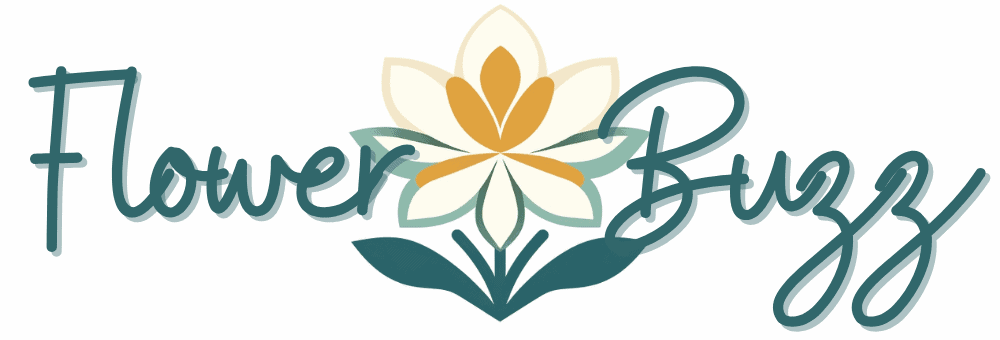
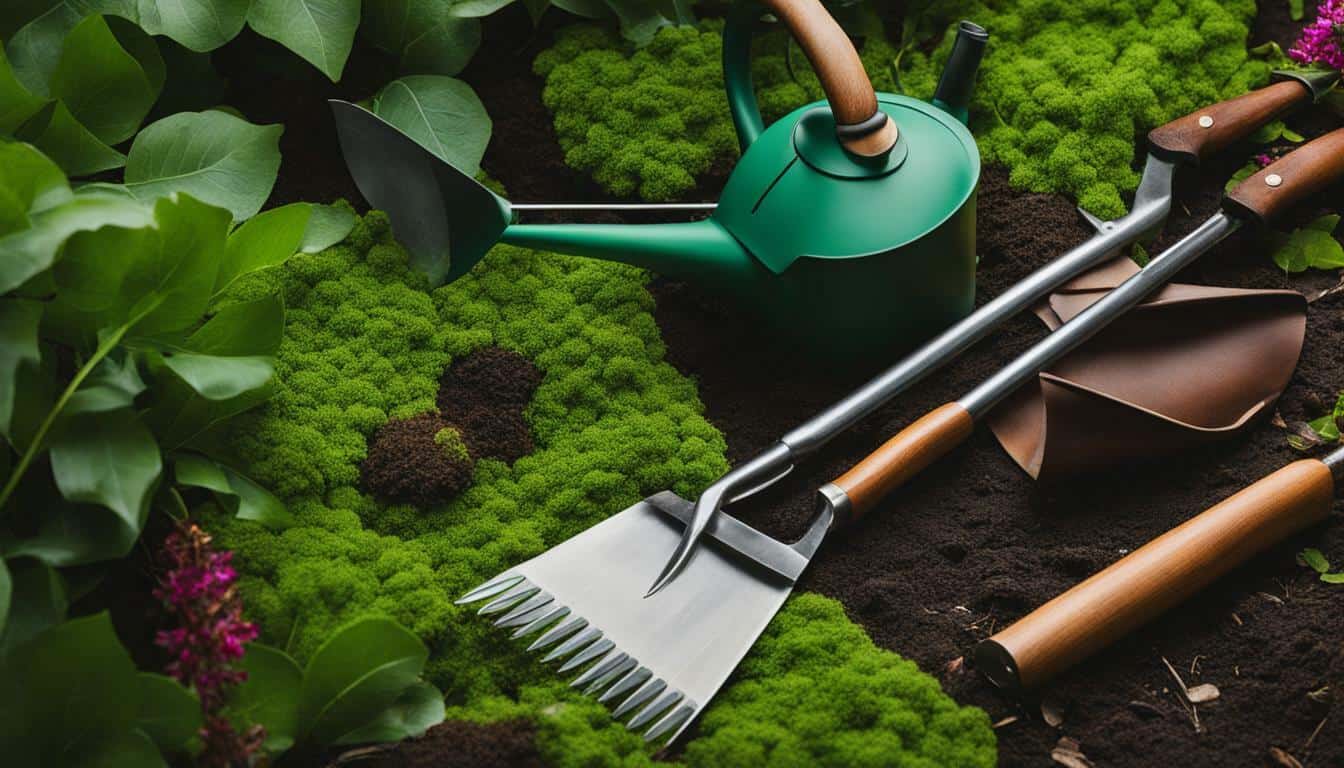
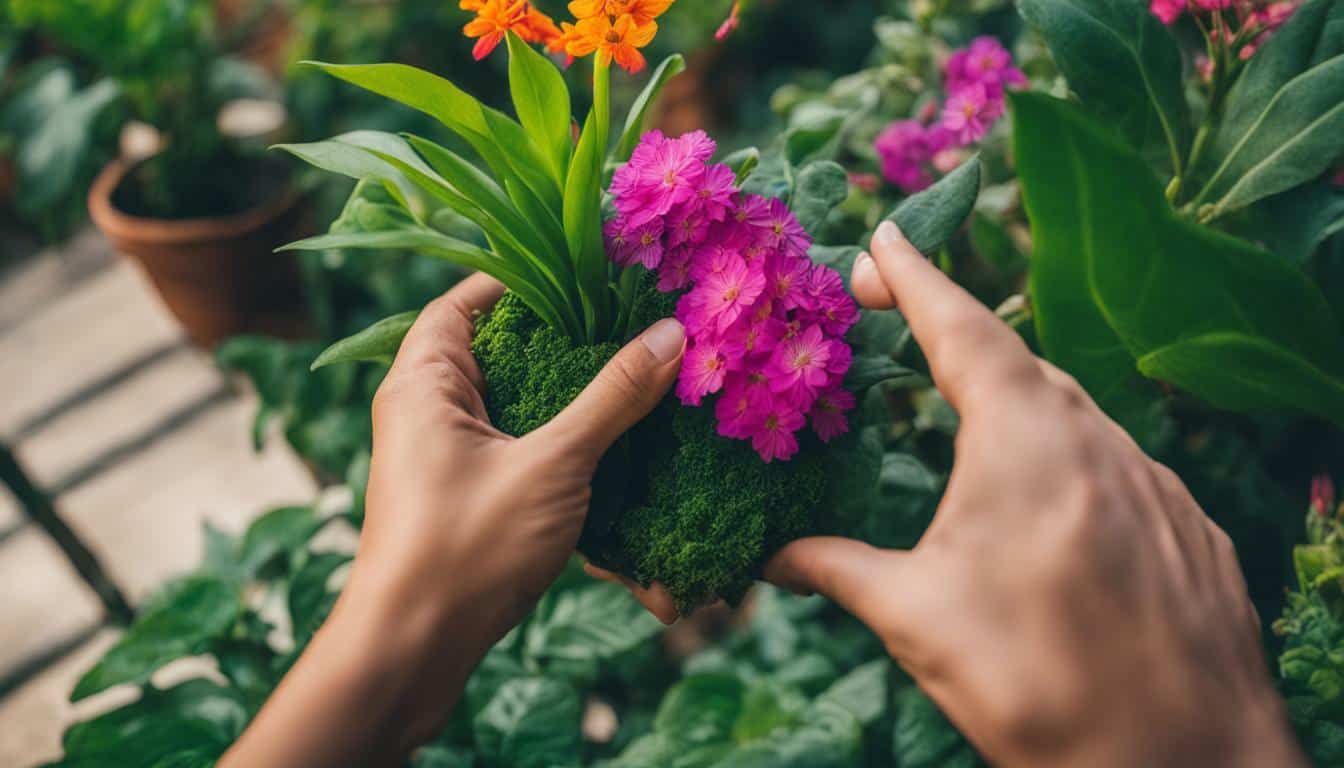
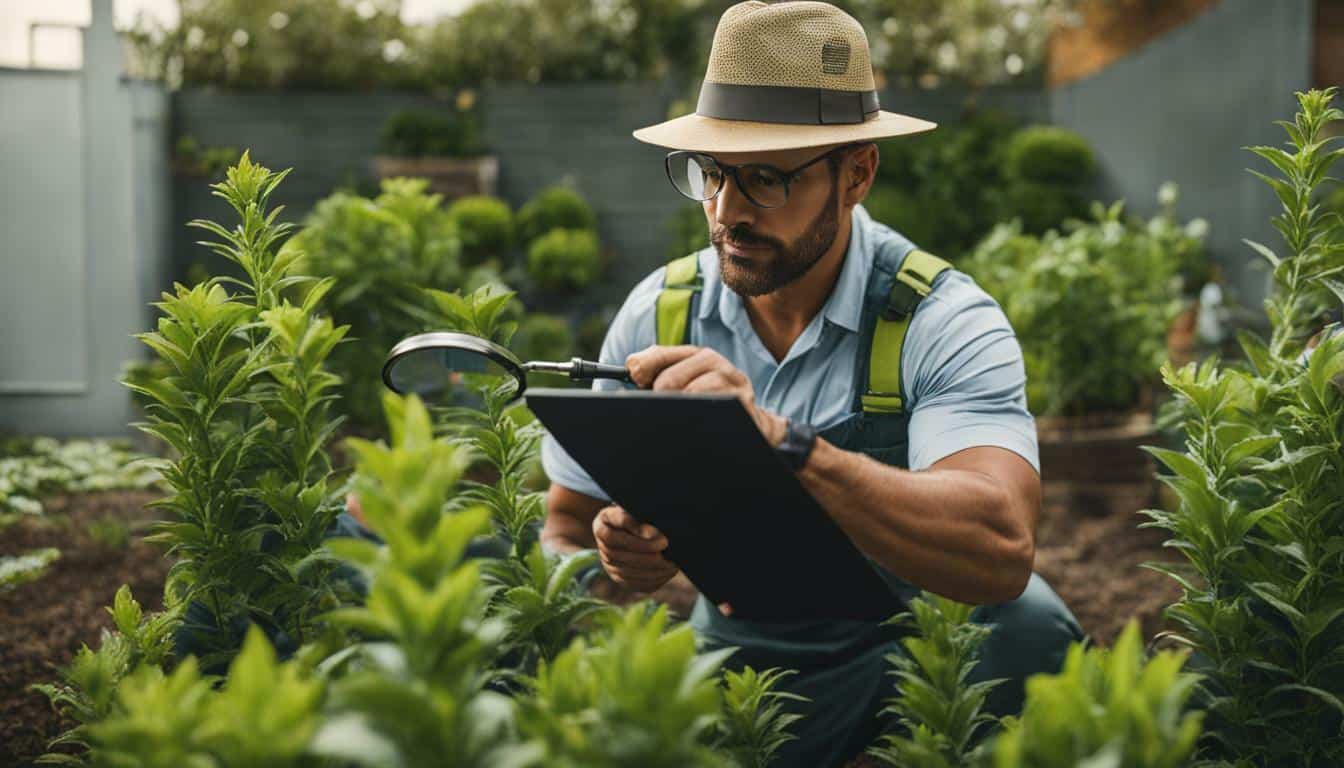

Leave a Reply